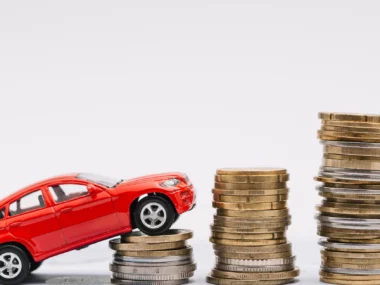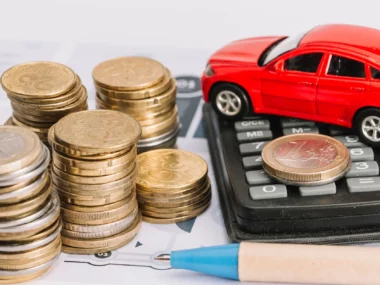Although having a vehicle makes it easier for people to get around, not everyone can afford to put down a lump sum of money to get it.
When you find yourself in a position where you need a car but can’t afford to buy it, numerous car financing options can help you out.
To be able to take full advantage of these options, it is advisable that you familiarize yourself with each one of them.
On that note, here is all you need to know about Car Finance and the Types You Can Leverage.
Table of Contents
What is Car Financing?
Car financing covers a variety of options that allow you to borrow the money needed to buy a car or lease it for a duration before buying it.
It is the use of a loan to finance the acquisition of a new or used vehicle, and then making monthly loan payments to the lender until the loan is fully repaid.
While most people opt to buy a car at once with cash, one of the upsides of using a loan is that you get to spread the cost of the vehicle over some time. This is especially a wonderful option for people who are unable to save up the amount needed to a vehicle.
Lenders of the needed loan to finance a car include credit unions, banks, and dealership-associated lenders.
The most common types of car finance agreements are hire purchase (HP), personal contract purchase (PCP), and lease purchase or personal loan.
How Does Car Financing Work?
There are different options when it comes to car financing, and regardless of which option you choose, it will involve taking a loan from a lender to finance the purchase of a new or used car.
You will be required to pay a non-refundable initial deposit and then regular installments throughout the duration of the loan.
At the end of the duration – depending on the option of car finance that you select – you will either have bought the car outright, be presented with the option to buy it, or you can return it to the dealership and either move on or begin a new finance deal.
Also, you will need to stick to the terms of the contract including adhering to any servicing plan and not going beyond the agreed yearly mileage.
Important Terms To Keep In Mind When Getting A Car Financed
After deciding to get a car financed, there are certain terms to familiarize yourself with so the process can be stress-free.
1. Car loan: This is the amount of money borrowed from a lender, such as a credit union, bank or lending entity affiliated with the car dealership, for the purchase of a vehicle.
2. APR: The Annual Percentage Rate (APR) is different from the interest rate charged on the car loan. The APR is the totality of the interest rate and every fee charged by the lender on the loan. Basically, the APR is the total cost that the borrower pays on the loan each year. Therefore, when shopping for a car loan, be sure to look for one with a low APR.
3. Principal: This is the main amount that you have borrowed from the lender. This does not include the interest or any fees charged on the loan. Interest is regarded as the cost of borrowing the principal. Typically, the first monthly payment you make will go towards settling any fees that are charged on the loan, the interest will be settled next, and the rest of the payment will be applied to the principal.
4. Car Loan Term: This is the duration of the loan. It is the number of months during which the borrower will have the loan and will keep making monthly payments. Most of these loans are usually available in 12-month increments, up to as 84 months.
5. Monthly Payment: This is the amount that the borrower will pay every month for the entire duration of the car loan.
Places Where You Can Finance A Car
When you are ready to finance a car, there are numerous lending options available, so it is crucial that you peruse each option thoroughly before making a choice:
1. Dealerships: One of the places to get a car financed is at a car dealership. Car manufacturers offer interest rate incentives to car dealers which, aids dealers in the competition for your business. To get a favorable Annual Percentage Rate (APR) for a car loan, be sure to ask the dealer about financing promotions.
2. Credit unions: Another option is credit unions. Typically, the interest rates charged on loans given out by credit unions are lower compared to rates at traditional banks. Credit unions offer numerous beneficial services. They offer personal auto-buying concierge services, they don’t charge application or funding fees, they offer numerous car finance options, they can provide a loan pre-qualification, and so on.
3. Banks: Traditional banks also offer auto loan financing and can provide a pre-qualification. However, one of the downsides of a traditional bank is that they often require a good credit score, otherwise, you may not qualify to get a loan.
Types Of Car Finance?
Hire Purchase (HP)
How it works here is that the borrower hires the car from the lender, and only becomes the owner of the vehicle when all the agreed payments have been made in full. After hiring the car, the borrower will start making monthly payments which will include the loan and interest.
The loan taken by the borrower is secured using the vehicle itself and he can at any point in time, choose to settle the outstanding finance by asking for a settlement amount from the lender.
When you use this option, you will probably be required to put down a deposit of around 10%, or more if you want better finance terms, in which you get to choose the length of repayment period (which is usually up to five years). A larger deposit will also determine the amount of your monthly payments.
Hire Purchase is one of the most commonly used forms of car finance, and unlike a credit card or personal loan, you are not allowed to alter or change the vehicle outside of the agreement.
Upsides of Hire Purchase
1. Your monthly payments are fixed, so you don’t have to worry about the figure changing before the end of the contract.
2. You are not required to pay a huge lump sum payment at the end of the contract.
3. The lender doesn’t put a restriction on the mileage of the car.
4. Since the finance will be resolved at the beginning of the contract, you are in a great position to negotiate on the price of the car.
Downsides of Hire Purchase
1. Your credit score could be harmed if you fail to make regular payments.
2. The car can be repossessed if you fail to make payments as agreed.
Personal Contract Purchase (PCP)
Just like a hire purchase agreement, a PCP requires you to pay a deposit and take out a loan which will be secured against the car itself. You will then have to make monthly repayments including interest over the agreed term, which is usually between 24 to 48 months. Your monthly payments will cover the cost of interest and any degeneration in the vehicle.
One of the ways that PCP differs from hire purchase is that there is a limit placed on the annual mileage of the car.
When the contract ends, you can choose to:
- Buy the car outright with a lump sum payment, also known as a balloon payment; or
- Give the vevehicle back to the dealership; or
- Use the equity that you have in the vehicle as a deposit for your next car.
Upsides of Personal Contract Purchase (PCP)
1. Monthly payments are usually lower since you might pay a large sum at the end of the contract.
2. You have the option to either retain the vehicle or give it back to the dealership at the end of the contract. You are not handcuffed to the car.
3. Just like HP, you are in a great position to negotiate on the price of the car upfront.
4. There is a fixed cost that doesn’t change.
Downsides of Personal Contract Purchase (PCP)
1. Deciding to keep the car at the end of the contract will cost you an amount that is equal to the estimated market value of the car.
2. Deciding to give back the car at the end of the contract will attract certain charges if the vehicle is not returned in a condition similar to what was stipulated in your agreement.
Personal Contract Hire (PCH)
Widely known as car leasing, Personal Contract Hire (PCH) is a long-term rental contract where you pay a deposit and subsequent monthly payments over some time (2-5 years), and get use of the car for the length of the contract. The deposit is usually equal to 3-6 times the monthly payment.
The amount set for monthly payments depends on the length of the contract, the agreed annual mileage, and the value of the vehicle.
One of the features that makes PCH different from other options is that you will be required to return the car at the end of the contract. However, you will have to pay for any damage that occurs to the vehicle during the contract.
This deal is usually offered by car dealerships, car supermarkets, and finance brokers.
Upsides of Personal Contract Hire (PCH)
1. You are allowed to change your car reasonably often.
2. You don’t need to worry about a vehicle’s devaluation with PCH finance.
3. Monthly payments are cheaper compared to PCP.
Downsides of Personal Contract Hire (PCH)
1. Compared to PCP, it usually requires a higher deposit.
2. Regardless of how much you like the car, you don’t have the option to purchase it at the end of the contract.
3. The lender usually sets a limit on the mileage of the car.
4. If you end up harming the car, you’ll have to pay for the repair.
Personal Loan
This is a renowned loan option that you can borrow for any purpose. It can be taken to cover different expenses including car financing. When you borrow a personal loan, you get a lump sum, then repay it in fixed monthly payments, with interest.
Its duration is usually between one to seven years. You can take out a personal loan and use the cash to buy a car. This means that you can buy the vehicle outright instead of having to wait till the end of a contract.
The interest rates charged usually depend on the amount you are borrowing. You may also need to pay some fees.
A personal loan can be secured or unsecured. A secured loan is cheaper but you will have to use your property as collateral. The risk here though, is that you might lose your property if you fail to keep up with your payments. You can get a personal loan from a bank, credit union, or an online lender.
Upsides of Personal Loans
1. You can use the funds obtained from the lender to purchase the car outright.
2. You can decide to combine the cash that you have in hand with a loan to pay for your car.
3. Since the loan is not secured against the car you’re buying, there is no chance of repossession.
4. Since you will have cash from a personal loan, you are not restricted as to where you can buy the car.
5. As a buyer who is paying the full price upfront, you are in a position to negotiate a better price for the car.
6. You immediately own the car after buying it, so you are free to do whatever you please with it.
Downsides of Personal Loans
1. Since you own the car outright, you alone will have to bear the cost of all repairs and servicing.
2. Some personal loans come with monthly payments that are higher compared to some other forms of car finance.
3. A poor credit might hinder you from getting a personal loan.
Guarantor Car Finance
This is an option designed to help borrowers with poor credit scores to get a car. Unlike other options of car finance, borrowers usually need to name a guarantor who agrees to be just as responsible for the loan as the borrower. This means that if the borrower misses payments for any reason whatsoever, the guarantor will be held responsible.
Loan companies often feel better lending to borrowers with poor credit when there is a reliable guarantor who can be held responsible for the loan.
Upsides Of A Guarantor Car Finance
1. A poor credit doesn’t hinder you from getting a car.
2. It can help you to repair your credit if you make timely monthly payments.
3. You can get the car now and make fixed monthly repayments over a set period of time.
Downsides Of A Guarantor Car Finance
1. The APR on this loan is usually higher compared to other options of finance.
2. You won’t get the finance if you don’t have anyone who is willing to act as your guarantor.
Is Financing a Car a Good Idea?
You can always decide to put down cash to get a car and save yourself the headache of having to make monthly payments to service a loan. A loan will cost you more money to own a car, as you would have to pay back the principal plus interest (and probably some fees, depending on the lender).
However, one of the disadvantages of paying cash is that you need to drop a huge lump sum of money, which could leave you with no emergency backup fund.
At the end of the day, the decision as to which option to use lies solely in your hand (as a borrower).
How To Choose The Best Financing Option For You
Although your personal choice and financial capability will determine the best financing option for you, there are a few other factors you will want to consider:
1. The finance options offered when the car you want to buy is new are different from the ones offered when the car is pre-owned. Therefore, the condition of the car that wish to buy is another factor to consider.
2. Your desire to either own or sell or own the car at the end of your deal.
3. The amount that you have for an upfront deposit.
4. The status of your credit score. Good credit will give you access to a vast range of finance deals at lower interest rates.
5. How do you plan to use the car? Certain finance options set limits on your mileage, with penalties if you drive beyond the set limit.
6. The type of car that you wish to get, whether manual or automatic.
Can I Get Car Finance With A Bad Credit Score?
Typically, car finance companies will take into account your credit history and credit score when you are being considered for a car loan. A low credit score might hinder you from having access to favorable loan terms such as low interest rates. However, some lenders offer certain deals that you might find acceptable.
How Much Does A Car Finance Cost?
The cost of car finance is usually an accumulation of your deposit, regular instalments, and any final payment if you choose to own the car at the termination of the contract.
Additional charges may also apply if you need to pay for servicing and repairs or you go beyond the set mileage.
How Long Does A Car Finance Term Last?
Generally, the duration of a car finance contract will depend on the agreement between the borrower and the finance provider. Car finance, such as hire purchsse or personal contract purchase usually run from around 2 to 5 years. A car loan could carry a similar term. Keep in mind that the longer the duration of your monthly payments, the more interest you will end up paying.
What Happens At The End Of The Finance Term?
Typically, the type of car finance you’ve chosen will determine your options at the end of the contract:
1. Hire purchase: For HP, what happens at the end of the finance term is that you will own the car after you have made the final payment.
2. Personal contract purchase: At the end of this contract, you are presented with few options. You can either make a one large ‘balloon’ payment to buy the car, you can give it back and walk away, or you can take out a new PCP contract.
3. Personal contract hire/leasing: Once this contract ends, you can either decide to give back the vehicle and walk away or take out a new lease.
In Conclusion:
From Hire Purchase (HP) to Personal Contract Purchase (PCP) to Personal Contract Hire (PCH) to other financing options, car financing can help borrowers get the desired vehicle without stress.
Ensure to familiarize yourself with each one of them, know their features, their upsides, and their downsides.




